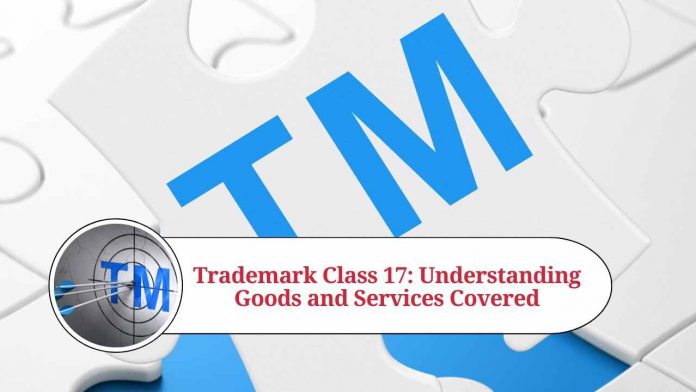Trademark Class 17: All You Need to Know
When it comes to trademark registration, it is important to understand the various trademark classes. Trademark Class 17 is one of the 45 classes identified by the Nice Classification System. In this blog, we will discuss all you need to know about Trademark Class 17.
Overview of Trademark Class 17
Trademark Class 17 pertains to rubber, gutta-percha, gum, asbestos, mica, and goods made from these materials. It also includes plastics in the form of sheets, blocks, and rods for use in manufacture.
Goods Covered Under Trademark Class 17
Trademark Class 17 covers a wide range of goods. The following is a list of some of the goods covered under this class:
- Rubber, gutta-percha, gum, asbestos, mica, and goods made from these materials
- Packing, stopping, and insulating materials
- Flexible pipes, not of metal
- Non-metallic hoses and tubing
- Plastic sheeting for agricultural purposes
- Plastic film for wrapping and packaging
- Plastic bubble packs for wrapping or packaging
- Plastic substances in extruded form for use in manufacture
- Plastic substances in moulded form for use in manufacture
- Plastic substances in semi-processed form for use in manufacture
- Insulating materials in the form of tapes, cords, or fabrics
- Sealing, packing, and insulating materials
- Non-metallic sealing and packing elements
Goods Not Covered Under Trademark Class 17
It is important to note that certain goods are not covered under Trademark Class 17. The following is a list of goods that do not fall under this class:
- Raw or partly processed rubber, gutta-percha, gum, asbestos, mica
- Metals in foil and powder form for use in painting, decorating, printing, and art
- Electric cables, wires, and conductors
- Pipes and tubes of metal
- Common metals and their alloys in the form of sheets, blocks, and rods for use in manufacture
Why is Trademark Class 17 Important?
Trademark Class 17 is important for businesses that manufacture or sell products made of rubber, plastic, or other non-metallic materials. By registering under this class, businesses can protect their brand identity and prevent others from using similar trademarks for the same or similar goods.
Trademark registration is an important step for businesses that want to protect their brand identity. When registering a trademark, it is essential to determine which class or classes the goods and services fall under. The Nice Classification System provides a framework for classifying goods and services for trademark registration purposes. There are 45 classes in the Nice Classification System, with each class covering specific goods and services.
Trademark Class 17, as we have discussed, pertains to rubber, gutta-percha, gum, asbestos, mica, and goods made from these materials. This class also includes plastics in the form of sheets, blocks, and rods for use in manufacture. Goods such as flexible pipes, non-metallic hoses, and tubing are also covered under this class. In addition, insulating materials in the form of tapes, cords, or fabrics, and non-metallic sealing and packing elements are included under Trademark Class 17.
It is important to note that certain goods are not covered under this class. For instance, raw or partly processed rubber, gutta-percha, gum, asbestos, and mica are not included under Trademark Class 17. Similarly, electric cables, wires, and conductors, pipes and tubes of metal, and common metals and their alloys in the form of sheets, blocks, and rods for use in manufacture are not covered under this class.
Trademarks registered under Trademark Class 17 provide legal protection to businesses that manufacture or sell products made of rubber, plastic, or other non-metallic materials. By registering under this class, businesses can prevent others from using similar trademarks for the same or similar goods, and protect their brand identity. It is important for businesses to understand which goods fall under this class and register their trademarks accordingly to avoid potential legal disputes in the future.
Conclusion
In conclusion, Trademark Class 17 is an important class for businesses that manufacture or sell products made of rubber, plastic, or other non-metallic materials. By registering under this class, businesses can protect their brand identity and prevent others from using similar trademarks for the same or similar goods. Understanding which goods fall under this class is essential for trademark registration and legal protection.
Read more useful content:
Frequently Asked Questions (FAQs)
What is Trademark Class 17?
Trademark Class 17 is a class of the Nice Classification System that pertains to rubber, gutta-percha, gum, asbestos, mica, and goods made from these materials. It also includes plastics in the form of sheets, blocks, and rods for use in manufacture.
What goods are covered under Trademark Class 17?
Trademark Class 17 covers a wide range of goods, including rubber, gutta-percha, gum, asbestos, mica, plastic sheeting, plastic film, plastic bubble packs, and non-metallic sealing and packing elements, among others.
What goods are not covered under Trademark Class 17?
Raw or partly processed rubber, gutta-percha, gum, asbestos, and mica are not covered under this class. Electric cables, wires, and conductors, pipes and tubes of metal, and common metals and their alloys in the form of sheets, blocks, and rods for use in manufacture are also not covered under this class.
Can a business register a trademark under multiple classes, including Trademark Class 17?
Yes, a business can register a trademark under multiple classes if the goods and services fall under those classes. It is important to determine which classes the goods and services fall under before registering a trademark.
What is the Nice Classification System?
The Nice Classification System is a framework for classifying goods and services for trademark registration purposes. It is used by trademark offices in many countries around the world.
Can a trademark registered under Trademark Class 17 be used for goods in other classes?
No, a trademark registered under one class cannot be used for goods or services in another class. Businesses must register their trademarks under the appropriate classes to protect their brand identity for specific goods and services.
Can a business change the class of their trademark registration?
Yes, a business can change the class of their trademark registration, but it is subject to the approval of the trademark office. It is important to consult with a trademark attorney before making any changes to the trademark registration.
How long does it take to register a trademark under Trademark Class 17?
The time it takes to register a trademark under Trademark Class 17 varies depending on the country where the trademark is being registered. In general, it can take several months to a year or more to complete the registration process.
What is the benefit of registering a trademark under Trademark Class 17?
Registering a trademark under Trademark Class 17 provides legal protection to businesses that manufacture or sell products made of rubber, plastic, or other non-metallic materials. By registering under this class, businesses can prevent others from using similar trademarks for the same or similar goods and protect their brand identity.
Can an individual register a trademark under Trademark Class 17?
Yes, an individual can register a trademark under Trademark Class 17 if they are the owner of the trademark and the goods or services fall under this class.




















